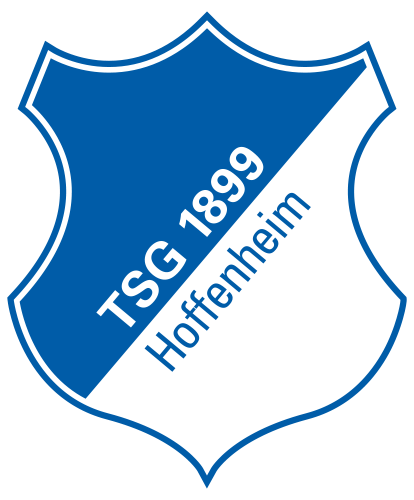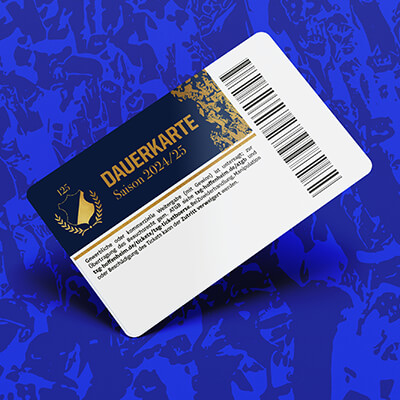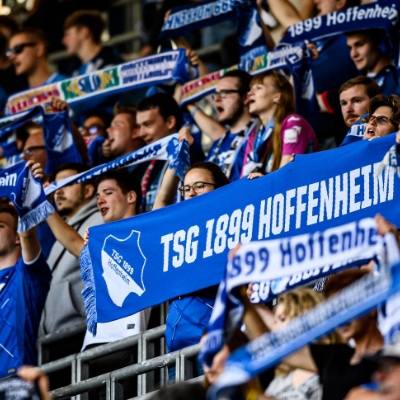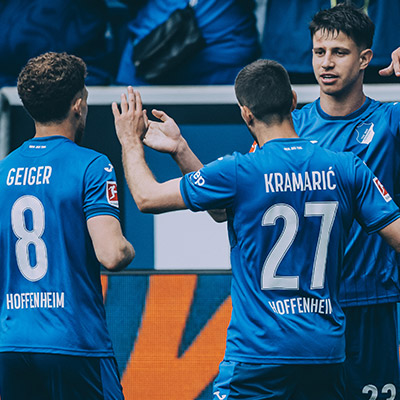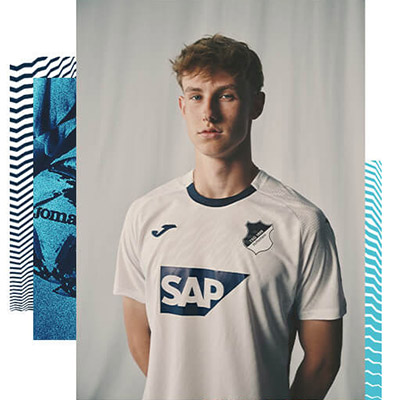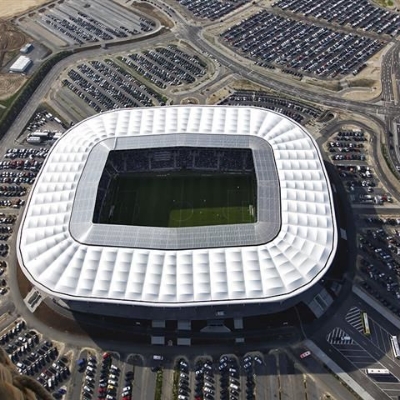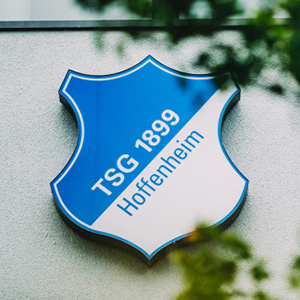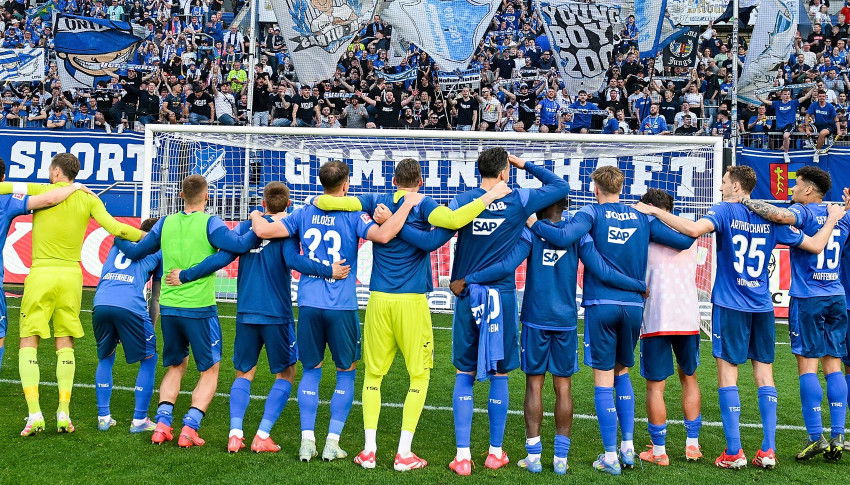“Mentality is everything in football”
At 23 years of age, you're actually still a young player. And yet it has already been seven years since you left Denmark to come to Germany. You've played for Borussia Dortmund, won the cup and spent spells on loan at VfB Stuttgart and RSC Anderlecht. Do you feel as though you've matured as a footballer in the past few years?
"I've already experienced a lot in my career and already feel experienced, despite my age. Football has developed at a rapid pace. Players at the age of 23 used to be the youngest in the team, but now there are teenagers who are first-team regulars in the world's best leagues – that's fascinating. It shows that if you're good enough, you're old enough too. And if that's not the case for me until I'm 23, that's just the way it is. I feel super happy and I’m delighted to have been able to give a lot to the team this season – in footballing terms, but mentally too.”
Have the experiences and the more difficult times in your career shaped you and perhaps made you more relaxed too?
"Definitely. I've learned to really enjoy and appreciate the good times and not to look ahead at what's around the corner. It's the now that counts; tomorrow will come regardless. Looking back, I wish I’d thought like that many years ago. But my path is what it is and I am grateful. Some players need more experience than others; there is no recipe or right or wrong en route to personal success."
What kind of thoughts were they that you now say were too much?
"They were wide-ranging. For example, I would get angry about a bad training session and couldn't wait to get back on the pitch to do better. It's important to be ambitious. But not every pass decides your career. Ambition doesn't always result in the right decisions; you have to know how to deal with it. And new players and circumstances add to your experience; you learn and develop further, off the pitch too. I can see clear changes. I've become much calmer and I talk a lot more with the coaching team. That has done me a lot of good. I've noticed that we want to achieve the same thing. That makes it easier to achieve success. I think we’ve gelled as a unit since this summer and established our joint path forwards. I enjoy it every day: the work on the pitch, the ongoing development, the talks with the coaching team – it's awesome."
Among the TSG staff is Hans-Dieter Hermann, a renowned sports psychologist, and the club is a pioneer in the field of sports psychology. Are you interested in this and do you make use of this resource?
"It's interesting on all levels, not only as a footballer. The special thing about sport is that you have to perform on the big stage, so you need a certain mental clarity: to stay calm and deliver the best-possible performance. In addition, social media has become an issue in recent years. There is even more discussion and evaluation than before – when you simply didn't read the newspaper the day after a match. This trend can have a strong mental impact on players, especially when they are still very young. But that's only a small part of the big picture; fluctuations in performance or problems with the coach can also be stressful. Mentality is everything in football. I can only emphasise that."
So in your eyes the right mentality is more important than talent?
"Ultimately, you can be as good as you want – with very few exceptions, you won't make it in professional football without the required mentality. Football is played primarily with the head. Of course, you need sporting weapons; without special ability, it will be very difficult. But of all the talents I've played with, the ones who went the furthest were the ones who had more mentality than talent. And this trend is far from over; the importance of mental strength will increase. That's why I think it's outstanding that TSG operates so progressively, it's a super interesting topic that can develop a player immensely. I know that from how I was before I talked to sports psychologists regularly, I used to think far too much. Pressure, competition, playing in front of fans – there are many influences on performance and it's immensely important to trust yourself. If your head doesn't play along, your legs are powerless."
In other countries, the subject of psychology is dealt with more openly; in Germany, many people still hesitate before taking the step to get help...
"The way I see it, you don't have to be sick to go to the doctor. You can also just have doubts and seek advice. I'm not sick either, but I like to talk about the things that move me. You learn an incredible amount about yourself, and about other people and situations too. You can't expect yourself to know everything either. And if I want to learn something about a topic, I have to talk to an expert who knows better. You listen to the coach because he is smarter than you on footballing matters. That's why I like to get advice from a psychologist. For me, it's the same as shooting at goal 30 times after training to improve my finishing. It's self-training; it helps me and makes me stronger."
You have also been through mental challenges in your private life. Your sister has already been diagnosed with cancer twice. Do experiences like those of your sister make you reassess the importance of professional sport?
"When someone in your family is so seriously ill and is also very young, it naturally changes many things and viewpoints in your life. I said at the time: 'I would stop playing football immediately if my sister could be healthy again.' Unfortunately, of course, it wasn't that simple, but it still holds true. Being a footballer is the most awesome job in the world for me. We are very privileged; I appreciate and enjoy that. I started playing this sport at the age of six and I probably won't stop until I'm 36. But life doesn’t stop after that and the most important thing will always be to stay healthy. It doesn't matter if you're a footballer, a teacher or a construction worker. If you're not, nothing else matters. Unfortunately, I had to learn that the hard way, but it's an important part of my life. I'm glad my sister is doing well now and I hope it stays that way."
How much have these hard times brought you together?
"With Borussia Dortmund’s permission, I flew home on every day I had off to be with her. I was at the hospital as often as possible and would have slept there if it had been allowed. I have huge respect for my parents for managing to do everything, even though they had to work. It wasn't as easy for them as it was for me to get two days off. It was unimaginably hard for them to stay positive and strong despite everything. My parents have not been together for a long time, but they still get along very well and these situations have brought the whole family very close together again. My parents, my grandparents, our best friends – everyone was there and helped."
Do such experiences sharpen the senses when it comes to dealing with the problems of everyday life?
"I’ve learned what is really important and to be grateful. I can do my job every day, put my foot on the gas and do what I love as a footballer. I still look at football the same way I did as a kid, who played in every break time. We professionals have nothing to complain about and I am grateful that I can make a living from football and support my family. I don't take it for granted and that's why I also try to squeeze every last drop out of this privilege. Becoming the best footballer possible is my biggest motivation."
You are a positive person. The Danes are considered to be among the happiest people in the world. How do you explain that?
"It's hard to say because I've been in Germany for so long (laughs). I think that the very pronounced German characteristics of seriousness and discipline helped me a lot. Both are a part of me. Certainly, in Denmark the atmosphere is a bit more relaxed; our doors are always open during the daytime, anyone can come in and out. That always surprised me when I travelled back home. I also think it's a bit more familiar because there are fewer of us, so we know each other better, have friends in common, etc. Germans are more structured and also a bit harder on themselves. In Denmark, people also like to work, but they also enjoy their free time a lot. Here you are appreciated if you work overtime and free time is rather reproached. However, I also needed exactly this German attitude as a young guy as I started out doing a little less than the others and not always what the coach wanted. I was a great talent for a long time and could therefore afford to do that. But I learned how to work and live as a professional in Germany. I got my talent from Denmark, but I became a football player here."
What surprised you most when you arrived in Germany as a 16-year-old?
"I was surprised that many things were rather old-fashioned compared to Denmark. My first day at school in Dortmund was a unique experience."
Why?
"My father had bought me a new laptop so that I was well prepared for lessons in a new country. I was 16 and hardly spoke any German. I came to school, was very motivated and opened my laptop before the first lesson. Then I looked around – you're a bit shier as a newcomer – and didn't see anyone else with a computer. That's when I thought: 'What's going on here?' My classmates all just had pens and paper on their desks. And then the teacher arrived and told me to please put my laptop away and take out my pens and notebooks, because class was about to start. I just said: 'Sorry, but I don't have a pencil, I don't have any paper, just my laptop.' That was a bit unpleasant, but that's how it was in Denmark. Everything at school there was already digital. My brother was six years old and went to school with a tablet – it was provided by the school and all the learning material was stored on it."
How was the change for you?
"I don't think it hurts to learn things the old-fashioned way. And it’s also more difficult in such a big country to equip the schools so well. In my country, taxes are very high and the state invests a lot in education and training. But at some point, I had the impression I’d travelled back in time. The fact that you only work with pen and paper in school and should write things out was something I felt I hadn’t done for 10 years. But it also had a positive impact: since I had to do everything in English, I was much more attentive with spelling. On the computer, everything is automatically corrected or shown to you as an error."
You had to prove yourself at school and at BVB, and your development in both areas was closely monitored at home. Were you worried about going back and having to say: 'Sorry, I didn't make it’?
"I didn't really even think about it. The first few months were so incredible; everything happened so quickly and I had such amazing experiences. There was no time for too many thoughts. I learned a new language, suddenly had to hold my own against much better footballers and I had to prove myself at school as well. It was very hard, but I loved it. From my room I could watch the first team train. At first, I could not imagine being there myself one day. And after less than three months, I got my first chance under Jürgen Klopp. I had just been living and playing in Hornbaeck, and now I was training with Robert Lewandowski. That's when I got a taste for it. It was the coolest thing I had experienced in my life up to that point. I called all my friends and told them about it and had to describe exactly what each star was like. I still remember that clearly, I was so incredibly happy that day – I wanted to experience that regularly."
You’ve now become a professional – and a star in many people’s eyes. How do you feel about that yourself?
"I don’t even know where to start. I am just as important as all other people and do my job just like the people who inspect tickets or sell sausages. Everyone does their job. In general, I'm happy when people enjoy coming to the stadium to see us. That's a bonus, but I don't see myself as a star or celebrity or whatever one bit. I'm still Jacob from Hornbaeck in Denmark. Only when I play in the stadium am I Jacob Bruun Larsen who grew up at BVB and now plays at Hoffenheim. When fans recognise me, I like to take time for them. I used to be like that myself and I loved that. In our job, anyone who doesn't have five minutes for the fans after training is a bit inhumane in my eyes. It's not enough just to be a professional on the pitch."



